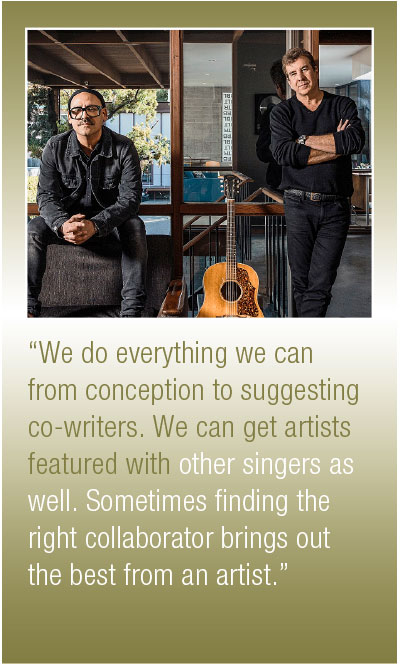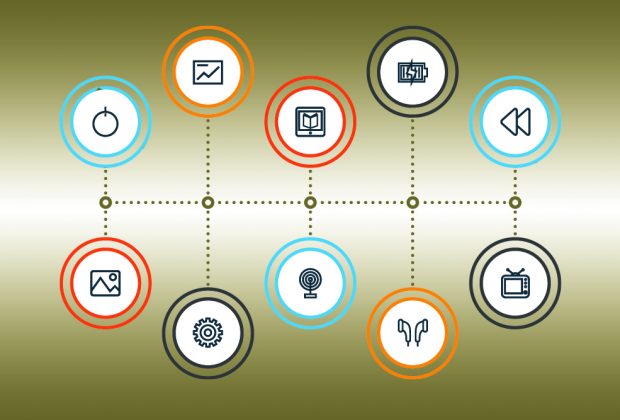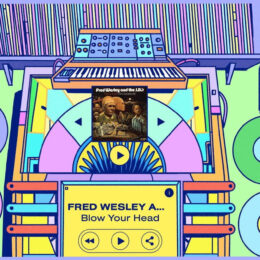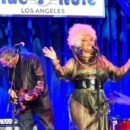 Josh Abraham and Scott Cutler
Josh Abraham and Scott Cutler
Company: Pulse Music Group
Clientele: Ty Dolla $ign, Sam Sparro, Starrah
Contact: pulserecordings.com
Scott Cutler and Josh Abraham both have a background in music: Cutler was a songwriter and Abraham produced records. They bumped into each other regularly and, eight years ago, the wisdom of combining their skills and connections dawned upon them. They signed four writers initially, notably then-rising writer Bonnie McKee on her path to write or co-write songs for Katy Perry and Britney Spears. Their natural talent for personal introductions proved to be key in their success. Pulse now employs 30 people.
What makes Pulse Music Group distinctive?
Josh and I are studio guys. We operate from our perspective of what it’s like to be songwriters. I know when a collaboration is good and when it’s bad. Josh knows how to get a band that doesn’t have the right songs find them quickly. We’ve done our 10,000 hours.
What do you do to make publishing better for the songwriters that you sign?
Our responsibility is to the song. We do everything we can from conception to suggesting co-writers. We can get artists featured with other singers as well. Sometimes finding the right collaborator brings out the best from an artist. Sync is huge, as is A&R––brand, iTunes ads, trailers, TV shows. That’s a constant conversation in our office.
Can you share a story about how an unsigned songwriter came to your attention?
When we only had two or three clients, Bonnie McKee was in a relationship with one of them. I heard [her sing] a ballad, which isn’t really what she’s known for. I remember thinking “This girl is incredible. She wrote this song by herself. I can’t imagine anyone being this good.” Finding someone like that is the greatest feeling.
How do the songwriters you sign respond to the changes in music?
I know how we respond: we try to stay loose on our feet and be able to make adjustments. Being a writer is like being a painter. It’s never complete and you’re never fully satisfied for very long. Since songs are small, you constantly have to do another. They’re like letters in the sand. The second you’re done, you have to do it again.
How do changes in the music industry––such as artists assuming more independence and posting their songs online––affect publishers?
There’s a lot of music out there that’s not easy to monetize. It’s our job to decide who’s signed. We have to be intelligent about it and understand the difference between something that can generate revenue and things that are more part of the SoundCloud service. Sometimes you take someone that’s putting out music for free and help them segue into something that has financial relevance.
How has streaming and decreasing album sales affected writers’ incomes?
There was a moment a few years ago where people weren’t buying music. Then the streaming and subscription models took off. On the streaming side, it’s been more lucrative on the label side. There are a series of things that are turning the boat around a bit. The Copyright Royalty Board gave us better rates, so we now get a 40% increase in publishing rights. There are one or two more hurdles before bargaining power returns to the writers.
Who among your writers are making a big name for themselves?
Starrah is an incredible story of success. She has the number one song in the country this week and she’s also had it many [other] times. We also recently signed Ty Dolla $ign––who recently had a number one with Post Malone––and Mitch The Kid, after looking at several folks that were in his lane.
Do you accept unsolicited material?
We’re not supposed to but often do. Most artists come to us through our A&R staff. We also have scouts. Lawyers and managers send us stuff as well.
In terms of audio quality, how good do you expect submissions to sound?
We like it to be as good as possible but we can hear past any quality [issues]. If the song’s there, it’ll stand out. Many of the submissions we get sound like they’re ready to go straight to the DSP [digital service provider]. People labor a lot harder on their demos than they did in the ‘90s or 2000’s. •












